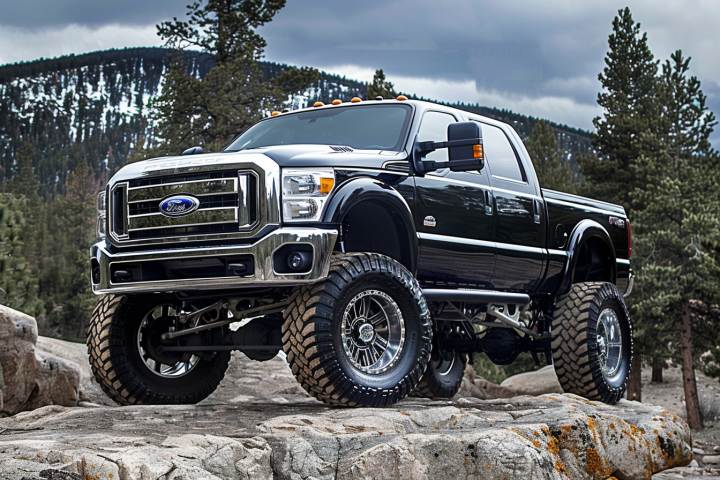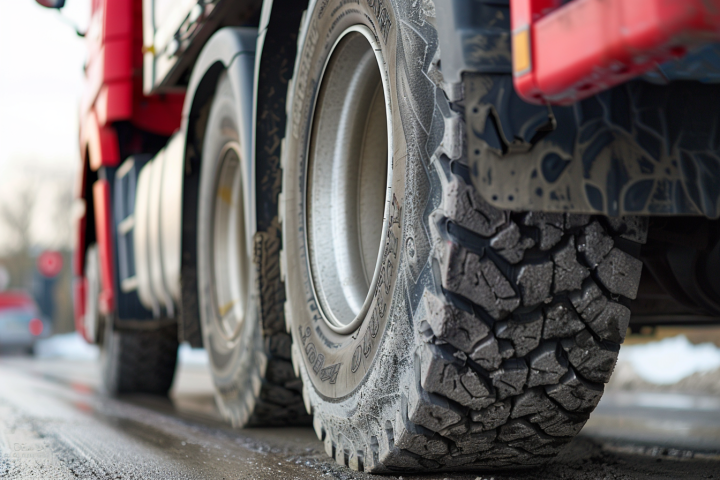Last Updated on August 28, 2024
Importance of Quality Tires and Wheels for Trucks
Your car’s contact with the road is mainly determined by the tires and wheels you choose. This relationship plays a critical role in figuring out how your vehicle responds to different driving situations:
Critical Aspects of Tire and Wheel Quality for Trucks:
The quality of truck tires and wheels is determined by durability, load capacity, and resistance to wear and tear. High-quality tires should offer consistent traction, withstand heavy loads, and provide long-term reliability. At the same time, wheels must be robust, properly aligned, and capable of supporting the tire’s performance under various driving conditions.
- Safety: Safety is the main priority for wheels and tires. High-quality tires provide better grip with the proper tread depth and patterns, which lowers the chance of collisions, particularly on slippery or rainy roads. As the support system for the tires, wheels need to be solid and defect-free to withstand the high loads and pressures that trucks usually experience.
- Performance: The right tires and wheels can significantly enhance a truck’s handling, braking, and general driving pleasure. Trucks need better control when driving on various terrain, and tires with more traction will provide that.
- Longevity and Durability: Trucks are frequently used for long-distance travel and heavy lifting. High-quality wheels and tires, made to resist severe conditions, provide longer service lives. This lowers the need for replacements more frequently, ultimately saving costs.
- Fuel Efficiency: A truck’s fuel efficiency is directly impacted by the state of its wheels and tires. Quality, properly inflated, and well-maintained tires can minimize rolling resistance, which lowers fuel consumption.
- Load Capacity: Heavy loads are the norm for trucks. The tires and wheels must support these loads without sacrificing performance or security.
Purpose of the Guide
This guide aims to give truck drivers and owners thorough knowledge on choosing, caring for, and the significance of tires and wheels for their vehicles. The purpose of this guide is to:
- Educate: Provide comprehensive information on the many tire and wheel options for various truck models, as well as the advantages and uses of each.
- Help in Making Decisions: Provide advice on what to consider when buying wheels and tires, such as price, performance, and fit for a particular truck’s requirements.
- Emphasize Benefit-Cost Analysis: Discuss the short—and long-term advantages of purchasing high-quality wheels and tires, highlighting the cumulative savings in longevity, fuel economy, and safety.
- Maintenance Tips: It provides tips and best practices for maintaining tires and wheels to ensure they remain in optimal condition, extending their lifespan and ensuring safety.
- Update on Latest Trends and Technologies: Keep truck owners informed about the latest advancements in tire and wheel technologies and how they can benefit their vehicles.
The guide is intended to serve as a valuable resource for truck owners, helping them make informed decisions about their tire and wheel investments and ensuring their trucks are safe, efficient, and cost-effective.

Assessing Your Truck’s Tire and Wheel Needs.
When it comes to trucks, whether for commercial or personal use, selecting the right tires and wheels is not just a matter of preference but a crucial decision impacting safety, performance, and cost-efficiency. This section delves into how truck owners can assess their tire and wheel needs accurately.
Identifying the Right Tire Type for Your Truck
The choice of tires for a truck depends on several factors, including the truck’s primary use, the usual driving conditions, and the truck’s specifications. Here are critical considerations for selecting the right tire type:
- Usage Type: Determine the truck’s usage type, such as long-distance driving, off-roading, construction, or city delivery. Different tire qualities are needed for each application. For instance, off-road tires prioritize durability and traction, whereas long-haul tires are made for high mileage and fuel economy.
- Patterns of Tread: The truck’s handling and safety depend heavily on its tread patterns. Treads come in three primary varieties: block, lug, and rib. Block designs balance the two: lug patterns are appropriate for off-road or uneven terrain, and rib patterns work well on flat, dry roads.
- Weather and Road Conditions: Consider the typical weather conditions the truck will encounter. For instance, winter tires are essential for snowy and icy conditions, offering better grip and safety.
Wheel Considerations for Different Truck Models
Wheels are the foundation on which tires sit and are equally important. Different truck models may require other wheel specifications:
- Wheel Size and Material: The truck’s specifications and the tire size should correspond with the wheel size. Bigger wheels could improve performance and look but also reduce fuel efficiency. While aluminum alloys are lighter and increase fuel efficiency, materials like steel are more resilient and affordable.
- Weight Capacity: Verify that the truck’s wheels can sustain its entire weight, including any normal loads it may carry. Wheels that are overloaded may become more dangerous and require more maintenance.
- Compatibility: The wheels must fit the particular truck model. Incompatible wheels can result in inappropriate tire wear and mechanical problems.
Load Capacity and Tire Durability
Due to the heavy-duty nature of their application, load capacity and tire durability are essential for truck tires:
- Load Rating: It is essential to comply with each tire’s load rating. Overriding this rating may cause tires to blow out. The truck’s maximum load capacity and the load rating should match.
- Tire Composition and Durability: For trucks that tow large objects or traverse uneven terrain, look for tires with reinforced sidewalls and robust compounds.
- Frequent Inspections: Check tires for wear and tear regularly. To increase tire life, uneven wear can indicate alignment, inflation, or suspension problems. These should be quickly fixed.
Cost Analysis
For the cost analysis of truck tires and wheels, a thorough grasp of both the upfront costs and the long-term advantages is necessary. This section provides truck owners with information on balancing these expenses and making wise choices.
Initial Costs vs. Long-Term Benefits
The initial cost of purchasing tires and wheels for trucks can be significant. However, focusing solely on the upfront cost can be misleading. It’s essential to consider the long-term benefits:
- Durability: Although higher-quality tires may cost more upfront, they typically last longer. Over time, this lowers the need for replacements, saving money.
- Fuel economy: Long-term fuel savings can be substantial for tires with higher fuel economy, even if they may initially cost more.
- Performance and Safety: Investing in higher-quality wheels and tires improves performance and safety and may lower mishaps or shoddy handling expenses.
- Cost of Maintenance: High-quality tires will save money over time since they require less regular maintenance.

Comparing Brands and Prices in Tires and Wheels Selection
Brand and cost are important considerations for truck owners or operators when choosing truck tires and wheels. The tires and wheels you select for your car will mostly depend on their total value, performance, longevity, and quality. Knowing how to assess these elements properly will help you make an informed choice that balances price and quality, ultimately impacting your truck’s efficiency and safety.
The Significance of Brands in Tire and Wheel Selection
When choosing truck tires and wheels, brand reputation is essential since well-known manufacturers frequently offer better quality, more dependable customer service, and better performance. The preferred brand can significantly impact the overall efficiency and safety of the car.
- Quality Assurance: Reputable tire and wheel brands typically carry a quality guarantee. These companies have made research and development investments to guarantee that their goods’ performance and safety requirements are met. For instance, companies like Bridgestone, Goodyear, and Michelin are renowned for their constant quality and stringent testing procedures.
- Range of Options: Well-known manufacturers usually have a more comprehensive selection of items to fit various truck models and road conditions. Whether you’re searching for highway, all-terrain, or heavy-duty tires, well-known companies are more likely to offer a range of choices.
- Technological Advancements: Leading brands often incorporate advanced technologies in their tires and wheels. These innovations can include enhanced tread patterns for better traction, durable materials for extended tire life, and fuel-efficient designs.
- Customer Support and Warranty: Reputable companies have extensive warranty plans and superior customer service. This feature is essential for truck owners since it offers a safety net in case of flaws or early wear.
Evaluating Price: Balancing Cost and Value
It is critical to weigh value against cost when determining the cost of wheels and tires. Although cheaper choices could save money upfront, they might require more frequent replacements or perform worse. On the other hand, more costly choices typically have higher quality and longer lifespans.
- Initial Cost vs. Long-Term Value: Although the initial cost should not be overlooked, assessing the tires and wheels’ long-term worth is crucial. Although less expensive solutions might save money upfront, their shorter lifespans, higher replacement costs, and specific safety hazards could result in higher costs.
- Performance vs. Price: A tire or wheel’s performance should be evaluated at cost. Although premium tires may cost more, their increased handling, enhanced safety features, and increased fuel efficiency can all help to offset the cost.
- Cost of Ownership: Consider the total cost of ownership, which includes the purchase price, maintenance costs, and potential savings in fuel efficiency and durability. Sometimes, investing in more expensive tires and wheels can be more cost-effective over the long haul.
Practical Tips for Comparing Brands and Prices
To compare brands and prices more efficiently, read reviews and research to learn about the features and durability of various items. To make an informed decision that balances cost, quality, and suitability, consider elements such as warranty, after-sales support, and track record in similar truck applications.
- Research and Reviews: To learn about the dependability and performance of various brands and models, do extensive research and read customer reviews. Websites for cars and online discussion boards can be excellent sources of information.
- Get Expert Advice: Speak with technicians or tire and wheel specialists. Their expertise and experience can help you select the ideal model and brand for your requirements.
- Look for Deals and Promotions: Watch for sales, discounts, or bundle deals, especially during off-season periods. Sometimes, high-quality brands offer promotions that make their products more affordable.
- Avoid Unknown Brands: Be conscious of brands that lack a proven track record. While their prices may be enticing, the risk of inferior quality could lead to higher costs and safety issues.
The Impact of Tire Quality on Fuel Efficiency
The quality of tires plays a crucial role in a truck’s fuel efficiency:
- Rolling Resistance: Tires with low rolling resistance require less energy (fuel) to move, leading to better fuel efficiency. High-quality tires are often designed to minimize rolling resistance.
- Proper Inflation: High-quality tires are better at maintaining adequate inflation levels, which is critical for fuel efficiency. Under-inflated tires can increase fuel consumption.
- Weight and Size: The weight and size of the tires can also impact fuel efficiency. Lighter tires may reduce fuel consumption, but balancing this with the need for durability and performance is crucial.
The cost analysis for truck tires and wheels should consider more than just the initial price tag. It requires a holistic view, considering long-term benefits such as durability, fuel efficiency, and overall performance. By understanding these factors, truck owners can make cost-effective decisions that benefit them in the long run.
Performance Factors
Performance is paramount for trucks used in commercial fleets or for personal purposes. This guide segment focuses on critical performance factors – traction and handling, wheel size and weight impact, and adaptability to different seasons and terrains.
Traction and Handling: Key to Truck Performance
Traction and handling are essential for the safe and effective functioning of trucks. The type and quality of tires utilized significantly impact these variables.
- Tire Tread Design: The design of the tires greatly aids traction. Deeper treads with larger spacing can improve traction in rainy or off-road conditions. A more streamlined tread pattern is preferred for highway driving for smoother handling and reduced road noise.
- Tire Composition: The rubber compound used in tires influences traction and handling. While more complex compounds offer longer tire life but may compromise grip, softer compounds often provide more grip but may wear out sooner.
- Handling and Stability: Trucks must be handled carefully, especially while towing large objects. By enhancing stability and steering responsiveness, the correct tires may make driving safer.
Impact of Wheel Size and Weight on Truck Dynamics
The size and weight of wheels are often overlooked but are vital factors in truck performance.
- Wheel Size: The truck’s handling and stability can be improved with larger wheels at higher speeds. They may, however, also add weight to the car, which could reduce its fuel economy.
- Wheel Weight: Heavy wheels increase the truck’s total weight, which impacts braking, acceleration, and fuel efficiency. Performance can be enhanced with lighter wheels, such as alloy ones, which can lower the unsprung weight.
- Wheel Material: The type of wheel material (alloy vs. steel) may affect the truck’s dynamics. Steel wheels are more robust and better suited for heavy-duty use, while alloy wheels, due to their reduced weight, can enhance handling and fuel efficiency.
Seasonal and Terrain Adaptability
Adapting to different seasons and terrains is crucial for optimal truck performance and safety.
- Seasonal Tires: Using season-specific tires, such as winter tires in snowy conditions, can significantly enhance traction and safety. These tires are designed to perform optimally in specific weather conditions.
- All-Terrain Tires: For trucks that navigate various terrains, all-terrain tires balance highway and off-road performance. They are designed to handle different surfaces while providing a comfortable ride.
- Adaptability Features: Some tires have features like reinforced sidewalls or particular tread patterns to enhance performance in specific conditions, such as muddy, rocky, or sandy terrains.
Based on these factors, making informed decisions about tires and wheels can improve the vehicle’s safety, efficiency, and longevity.
Maintenance and Longevity
Proper tire and wheel maintenance is fundamental to extending their lifespan and ensuring the safety and efficiency of your truck. This section covers essential maintenance tips, understanding wear and replacement cycles, and considerations for warranties and services.
Regular Maintenance Tips for Tires and Wheels
Regular maintenance of tires and wheels is crucial for prolonging their life and maintaining performance. Here are some essential tips:
- Regular Inspections: Periodically check your tires for signs of wear, damage, or foreign objects lodged in the tread. Also, inspect wheels for any cracks, bends, or corrosion.
- Tire Pressure Monitoring: Keep tires inflated to the manufacturer’s recommended pressure. Under-inflated or over-inflated tires can lead to uneven wear, reduced fuel efficiency, and increased risk of tire failure.
- Balancing and Alignment: Have your tires and wheels balanced and aligned regularly. This prevents uneven wear and ensures the vehicle drives straight, reducing strain on the suspension and steering components.
- Rotation Schedule: Follow a tire rotation schedule to ensure even wear on all tires. This can extend the overall life of your tires and improve performance.
- Cleaning: Regular cleaning of tires and wheels keeps them looking good and helps identify any issues like cracks or leaks early.
Understanding Tire Wear and Replacement Cycles
Tire wear and replacement cycles vary based on usage, tire type, and driving conditions. Understanding these factors can help in planning for replacements:
- Wear Patterns: Inconsistent wear patterns may point to suspension or alignment problems. If these are found early on, more harm can be avoided.
- Tread Depth: Continually check the tread depth. When the tread reaches the legal limit, usually 1/16th of an inch, the tires should be replaced.
- Tire Age: Tires should be changed every six to ten years, even if the tread is not worn out due to aging and weather exposure.
- Conditions of Use: Trucks that tow large objects or operate in inclement weather may need to replace their tires more frequently.
Warranty and Service Considerations
When purchasing tires and wheels, understanding the warranty and service options is important:
- Warranty Coverage: Verify the manufacturer’s warranty. It might mask artistic and material flaws for a predetermined time or distance.
- Service Packages: A few merchants provide routine rotations, balancing, and inspections as part of their service packages. These may be convenient and reasonably priced.
- Extended Warranties: Depending on your usage, evaluate if extended or road hazard warranties are worth the additional expense.
- Maintaining Records: Maintain a record of every repair and service done on your wheels and tires. This might help you remember when services are required and file warranty claims.
Making the Purchase Decision
Making the buying selection is the last step in getting new tires and wheels for your truck. This entails assessing vendors and merchants, choosing between online and in-store purchases, considering financing, and following financial advice. Here is a closer examination of these elements:
Evaluating Suppliers and Retailers
Choosing the right supplier or retailer is crucial for a satisfactory purchase. Here are some factors to consider:
- Reputation: Seek vendors with an excellent quality and customer service track record. Examine reviews and ask other truck owners or professionals in the field for recommendations.
- Product Selection: Look for a store with a large selection of goods. This guarantees that various solutions are available to meet your unique requirements.
- Expertise: Providers focusing on truck tires and wheels will probably provide more knowledgeable assistance and goods made especially for trucks.
- Customer service: Help with problems and post-purchase support are essential to good customer service.
- Pricing and Offers: Examine costs and watch for special offers or reductions. But remember that the least expensive option is often the best in terms of longevity and quality.
Online vs. In-Store Purchases: What to Consider
Both online and in-store purchases have their pros and cons:
- Convenience: The ability to explore and buy from anywhere makes online buying convenient. Nonetheless, purchasing in-store lets you view the item in person and receive prompt installation.
- Price Comparison: Online comparison shopping makes finding discounts and comparing costs simpler, but in-store shopping may yield more customized offers.
- Professional Advice: Expert guidance and prompt resolution to inquiries are typically advantageous when purchasing in-store. Online shopping may provide thorough product details and reviews.
- Return and Warranty Guidelines: Examine the warranty and return policies. Policies regarding purchases made online and in-store differ.
Financing Options and Budgeting Tips
Tires and wheels can be a significant investment, especially for high-quality products. Here’s how to manage the financial aspect:
- Budgeting: Determine your budget beforehand. Consider the total cost, including installation and any additional services.
- Financing Options: Some retailers offer financing options. Evaluate these carefully to understand the terms, interest rates, and any additional fees.
- Cost vs. Value: Remember, the cheapest option is sometimes the most cost-effective in the long run. Investing in quality may save money on replacements and maintenance.
- Savings Plan: If the purchase is not urgent, consider saving up over a few months. This can help manage the financial impact without resorting to financing.
- Special Offers and Discounts: Watch for seasonal sales, special offers, and discounts. Sometimes, suppliers offer promotions that can lead to significant savings.

Conclusion & Recommendations
This comprehensive guide covered various critical aspects of choosing, maintaining, and investing in truck tires and wheels. We began by emphasizing the importance of quality tires and wheels for safety, performance, and efficiency. We then assessed specific tire and wheel needs based on truck models, usage types, and terrains. The cost analysis section highlighted the balance between initial investment and long-term benefits, stressing the significance of quality in terms of durability and fuel efficiency.
Performance factors such as traction, handling, and adaptability to different seasons and terrains were discussed to underscore their impact on a truck’s overall functionality. Maintenance and longevity were also crucial topics, where regular care and understanding of wear patterns emerged as essential for extending the life of tires and wheels. Finally, we navigated the decision-making process, including evaluating suppliers and retailers, the pros and cons of online vs. in-store purchases, and financial considerations to ensure a sound investment.
Recommendations for Truck Owners
The proper wheels and tires for a truck are an investment in the vehicle’s performance, efficiency, and safety—not simply another purchase. Thinking about your decision’s short- and long-term effects is critical. Put quality and suitability above all else, know your truck’s needs, and keep up with upkeep and repairs. Your tires and wheels may last much longer with routine inspections and attention to maintenance schedules, ultimately saving you money and keeping you safe on the road.
Although the wide range of choices and factors may appear overwhelming, keep in mind that this investment is essential to the smooth operation of your truck. Select a provider with many high-quality products and stand behind their sales with knowledge and dependable customer support.
Why Tires Easy Truck
At Tires Easy Truck, we understand the critical role tires and wheels play in your truck’s performance and safety. Our comprehensive selection caters to all your needs, whether navigating rough terrains, enduring long hauls, or managing day-to-day tasks. We offer a variety of brands and models, ensuring you find exactly what your truck needs.
Moreover, our team of experts is always ready to guide you through the selection process, ensuring that your purchase aligns perfectly with your truck’s requirements and budget. With our commitment to quality, competitive pricing, and exceptional customer service, Tires Easy Truck is your go-to destination for all your truck tire and wheel needs.
Find the Perfect Tires for Your Truck Now – Visit Tires Easy Truck
Make your choice today and drive confidently, knowing your truck is equipped with the best tires and wheels in the market. Your journey toward enhanced performance, safety, and efficiency starts with a click. Visit us now and take the first step in optimizing your truck’s capabilities with Tires Easy Truck.
FAQs
What should be considered when purchasing tires?
When buying tires, consider the tire size, load capacity, fuel efficiency, tread pattern for proper traction, and type appropriate for your car and driving circumstances. Make sure they meet your demands whether you are driving on a city, freeway, or off-road.
What are the considerations of tire selection?
Understanding your vehicle’s specifications, the terrain you will be traveling on, the weather, tire durability, and performance characteristics like handling and braking economy are all critical factors to consider when choosing tires. Other crucial considerations include cost and brand reputation.
What are the qualities of a good tire?
Excellent traction, long tread life, fuel economy, and ideal pressure retention are all features of a quality tire. It should balance longevity and performance well, offer stability and handling, and be appropriate for various driving situations (such as off-road, wet, or dry).
What is a budget tire?
A budget tire is affordable, typically offering essential performance and safety features. These tires are designed for cost-conscious consumers, prioritizing value over advanced features or extended durability in premium tires.
Is there a big difference between budget tires and premium tires?
Yes, there is a significant difference. Premium tires generally offer advanced technology for better traction, handling, durability, and enhanced safety features. Budget tires, while more affordable, may provide a different level of performance or longevity.
Why are quality tires essential?
Optimal handling, stability, fuel efficiency, and safety are all improved by high-quality tires. They are essential for safe driving, particularly in poor weather and road conditions.
How essential are tires on a truck?
Truck tires are crucial since they affect the vehicle’s handling, fuel economy, load-carrying capacity, and general safety. Choosing the correct tires is essential for longevity and optimum performance, considering how heavily vehicles are used.
What is the importance of a wheel in a truck?
A truck’s wheels are essential because they hold up the tires, alter load capacity, reduce fuel consumption, and improve the vehicle’s overall handling and stability. Thanks to the appropriate wheels, the car can carry out its intended duties safely and effectively.
Why are wheels and tires necessary?
Tires and wheels are essential for a car’s efficiency, performance, and safety. They directly impact the vehicle’s driving characteristics by ensuring adequate traction, handling, and stability. They are crucial elements that affect both safety and the overall driving experience.











 English
English Français
Français Español
Español